Mammal Conservation
Isle Royale Wolves
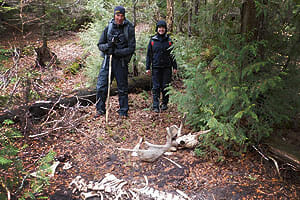 The DZS provides support to the Isle Royale wolf study at Michigan Tech University, and assists with field work on the Moosewatch expeditions. In the summers of 2016, 2017 and 2018, the DZS led teams of Moosewatch researchers to explore the backcountry of Isle Royale for moose skeletons. Moose are the primary prey for wolves on Isle Royale, and the Moosewatch program has studied the dynamics of the wolf and moose populations for more than 50 years in the longest continuous study of a predator-prey system. Once a moose skeleton is found, the timing of death is estimated, and the bones are examined to learn more about the cause of death. Chewed bones and widely dispersed leg bones suggest wolves may be to blame. The wolf population on Isle Royale has declined over the last several years to only two individuals because ice bridges that link Isle Royale with the mainland do not form as often as the climate has warmed. As a result, the moose population has exploded to the detriment of the Isle Royale ecosystem. To counteract this, additional wolves from the mainland were transferred to Isle Royale in the fall of 2018 to help the wolf population and the ecosystem recover.
The DZS provides support to the Isle Royale wolf study at Michigan Tech University, and assists with field work on the Moosewatch expeditions. In the summers of 2016, 2017 and 2018, the DZS led teams of Moosewatch researchers to explore the backcountry of Isle Royale for moose skeletons. Moose are the primary prey for wolves on Isle Royale, and the Moosewatch program has studied the dynamics of the wolf and moose populations for more than 50 years in the longest continuous study of a predator-prey system. Once a moose skeleton is found, the timing of death is estimated, and the bones are examined to learn more about the cause of death. Chewed bones and widely dispersed leg bones suggest wolves may be to blame. The wolf population on Isle Royale has declined over the last several years to only two individuals because ice bridges that link Isle Royale with the mainland do not form as often as the climate has warmed. As a result, the moose population has exploded to the detriment of the Isle Royale ecosystem. To counteract this, additional wolves from the mainland were transferred to Isle Royale in the fall of 2018 to help the wolf population and the ecosystem recover.
Eurasian Otters in Armenia
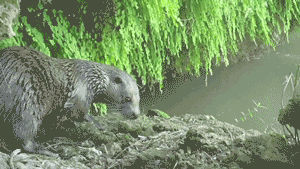 The DZS is working to conserve Eurasian otters in Armenia, a small country between the Black and Caspian seas in southwest Asia. Despite its small size, Armenia is important to wildlife conservation because it is part of the Greater Caucasus Mountains biodiversity hotspot. Eurasian otters are a vital part of the Armenian ecosystem because they can be indicators of healthy rivers and streams. Otters are considered endangered in Armenia, but there is little current information on their status. The DZS is conducting sign surveys for otter feces and feeding remains as well as using trail cameras to determine the status of otters; initial fieldwork conducted since 2018 suggests they have recovered in much of central, southern and northern Armenia as demonstrated by one of our trail cameras above. The DZS also received reports of human-otter conflict due to otters eating fish out of fish farm ponds, and is investigating ways to reduce this conflict.
The DZS is working to conserve Eurasian otters in Armenia, a small country between the Black and Caspian seas in southwest Asia. Despite its small size, Armenia is important to wildlife conservation because it is part of the Greater Caucasus Mountains biodiversity hotspot. Eurasian otters are a vital part of the Armenian ecosystem because they can be indicators of healthy rivers and streams. Otters are considered endangered in Armenia, but there is little current information on their status. The DZS is conducting sign surveys for otter feces and feeding remains as well as using trail cameras to determine the status of otters; initial fieldwork conducted since 2018 suggests they have recovered in much of central, southern and northern Armenia as demonstrated by one of our trail cameras above. The DZS also received reports of human-otter conflict due to otters eating fish out of fish farm ponds, and is investigating ways to reduce this conflict.
Snow Leopard/Red Panda
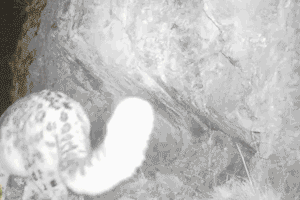 The Detroit Zoological Society (DZS) collaborated with the Xinjiang Institute of Zoology to study snow leopards in the Tienshan Mountains of Xinjiang province in northwest China. Trail cameras triggered by motion and heat demonstrated several important areas for snow leopards as shown by the video below, and we applied for protected area status with the provincial and national governments to limit human impacts in these areas. The DZS now collaborates with the Jane Goodall Institute Nepal and the National Trust for Nature Conservation to study and conserve snow leopards, red pandas and other alpine fauna in Nepal. This work also uses trail cameras to remotely monitor snow leopards and their prey as well as red pandas. Herders are also interviewed to learn more about human-wildlife conflict from snow leopard predation of livestock and to find ways to reduce this conflict.
The Detroit Zoological Society (DZS) collaborated with the Xinjiang Institute of Zoology to study snow leopards in the Tienshan Mountains of Xinjiang province in northwest China. Trail cameras triggered by motion and heat demonstrated several important areas for snow leopards as shown by the video below, and we applied for protected area status with the provincial and national governments to limit human impacts in these areas. The DZS now collaborates with the Jane Goodall Institute Nepal and the National Trust for Nature Conservation to study and conserve snow leopards, red pandas and other alpine fauna in Nepal. This work also uses trail cameras to remotely monitor snow leopards and their prey as well as red pandas. Herders are also interviewed to learn more about human-wildlife conflict from snow leopard predation of livestock and to find ways to reduce this conflict.
Snow Leopard Trust
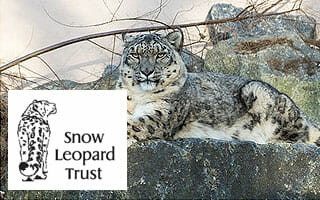 The Detroit Zoological Society further enhances snow leopard conservation by providing financial support to the Snow Leopard Trust (SLT). The SLT strives to create sustainable conservation programs that benefit snow leopards and local communities that share the mountain habitats. It works in five of the 12 countries that have snow leopards (China, India, Mongolia, Pakistan, and Kyrgyzstan) where it has established programs to compensate herders for livestock killed by snow leopards and to generate income for herders involved in snow leopard conservation programs. These programs involve snow leopard monitoring and removing livestock from certain areas to increase populations of natural snow leopard prey such as blue sheep.
The Detroit Zoological Society further enhances snow leopard conservation by providing financial support to the Snow Leopard Trust (SLT). The SLT strives to create sustainable conservation programs that benefit snow leopards and local communities that share the mountain habitats. It works in five of the 12 countries that have snow leopards (China, India, Mongolia, Pakistan, and Kyrgyzstan) where it has established programs to compensate herders for livestock killed by snow leopards and to generate income for herders involved in snow leopard conservation programs. These programs involve snow leopard monitoring and removing livestock from certain areas to increase populations of natural snow leopard prey such as blue sheep.
Polar Bear/Grizzly Bear
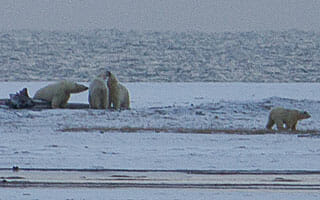 The Detroit Zoological Society collaborates with the United States Geological Survey, the United States Fish and Wildlife Service, the Arctic National Wildlife Refuge and the village of Kaktovik in field research about the overlap in resource use between polar bears and grizzly bears on the north slope of Alaska. Such overlap is increasing as both bear species shift their ranges in response to climate change. For example, decreasing sea ice forces polar bears to spend more time onshore while the berries and prey of grizzlies are shifting north with warmer temperatures. The Inupiat population at Kaktovik hunts three bowhead whales per year for subsistence, and both bear species have been observed scavenging on the whale carcasses. This scavenging will likely become more and more important for both bear species in the future. Information on population status and habitat use is urgently needed to better understand how polar bears are faring as a result of climate change and increasing human use of bear habitat.
The Detroit Zoological Society collaborates with the United States Geological Survey, the United States Fish and Wildlife Service, the Arctic National Wildlife Refuge and the village of Kaktovik in field research about the overlap in resource use between polar bears and grizzly bears on the north slope of Alaska. Such overlap is increasing as both bear species shift their ranges in response to climate change. For example, decreasing sea ice forces polar bears to spend more time onshore while the berries and prey of grizzlies are shifting north with warmer temperatures. The Inupiat population at Kaktovik hunts three bowhead whales per year for subsistence, and both bear species have been observed scavenging on the whale carcasses. This scavenging will likely become more and more important for both bear species in the future. Information on population status and habitat use is urgently needed to better understand how polar bears are faring as a result of climate change and increasing human use of bear habitat.
Grevy’s Zebra Trust
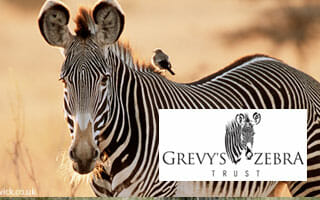 The Detroit Zoological Society provides financial support for the Grevy’s Zebra Trust (GZT) to help conserve Grevy’s zebras. The fates of Grevy’s zebra and human livelihoods are inextricably linked to the fragile ecosystem that they inhabit. As a result, GZT works closely with the community rangelands of Kenya and Ethiopia to monitor and protect endangered Grevy’s zebras. GZT has education and awareness programs for pastoral children as well as rangeland rehabilitation programs that focus on planned livestock grazing. The success and sustainability of Grevy’s zebra conservation is thus critically dependent on having the commitment of communities living across its range. In 2012, GZT was awarded the Association of Zoos & Aquariums (AZA) International Conservation Award.
The Detroit Zoological Society provides financial support for the Grevy’s Zebra Trust (GZT) to help conserve Grevy’s zebras. The fates of Grevy’s zebra and human livelihoods are inextricably linked to the fragile ecosystem that they inhabit. As a result, GZT works closely with the community rangelands of Kenya and Ethiopia to monitor and protect endangered Grevy’s zebras. GZT has education and awareness programs for pastoral children as well as rangeland rehabilitation programs that focus on planned livestock grazing. The success and sustainability of Grevy’s zebra conservation is thus critically dependent on having the commitment of communities living across its range. In 2012, GZT was awarded the Association of Zoos & Aquariums (AZA) International Conservation Award.
Jane Goodall Institute
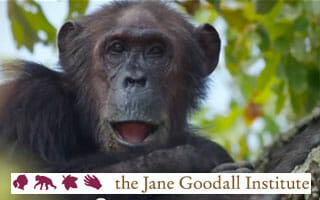 The Detroit Zoological Society provides financial support for the Jane Goodall Institute (JGI) which builds on Dr. Goodall’s ground-breaking scientific work with chimpanzees and her humanitarian vision. JGI is a global nonprofit that empowers people to make a difference for all living things. Specifically, JGI seeks to:
The Detroit Zoological Society provides financial support for the Jane Goodall Institute (JGI) which builds on Dr. Goodall’s ground-breaking scientific work with chimpanzees and her humanitarian vision. JGI is a global nonprofit that empowers people to make a difference for all living things. Specifically, JGI seeks to:
1. improve global understanding and treatment of chimpanzees and other great apes through research, public education and advocacy;
2. contribute to the preservation of great apes and their habitats by combining conservation with education and promotion of sustainable livelihoods in local communities; and
3. create a worldwide network of young people who have learned to care deeply for their human community, for all animals and for the environment, and who will take responsible action to care for them.
Ngogo Chimpanzee Project
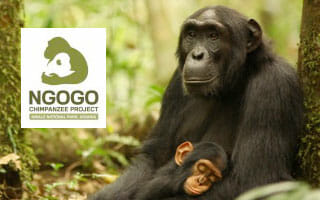 The Detroit Zoological Society also supports the conservation work of the Ngogo Chimpanzee Project (NCP) at Kibale National Park, Uganda. Kibale contains the largest population of chimpanzees in Uganda and one of the largest in East Africa, making it one of the few remaining strongholds for chimpanzees in the wild. The main threat to chimpanzees in Kibale is poaching, which has increased in frequency alongside increases in local human populations. Although there are local taboos against eating chimpanzees, they get caught in the snares set by poachers to catch other wildlife so often that it is estimated that fully one-third of the chimpanzees within the park have snare-related injuries. Those chimpanzees who are able to free themselves usually cannot remove the snares entirely, and over time, the wire or nylon material becomes wrapped tighter and tighter around their fingers, hands, or feet, causing pain and infection, and often leading to the loss of the snared body parts entirely or even death. In an effort to protect chimpanzees and other animals in Kibale, the NCP employs a team of local people who patrol the park for snares and signs of poaching activity working closely with local Uganda Wildlife Authority law enforcement officers who receive confiscated snares and GPS coordinates when poaching activity is encountered.
The Detroit Zoological Society also supports the conservation work of the Ngogo Chimpanzee Project (NCP) at Kibale National Park, Uganda. Kibale contains the largest population of chimpanzees in Uganda and one of the largest in East Africa, making it one of the few remaining strongholds for chimpanzees in the wild. The main threat to chimpanzees in Kibale is poaching, which has increased in frequency alongside increases in local human populations. Although there are local taboos against eating chimpanzees, they get caught in the snares set by poachers to catch other wildlife so often that it is estimated that fully one-third of the chimpanzees within the park have snare-related injuries. Those chimpanzees who are able to free themselves usually cannot remove the snares entirely, and over time, the wire or nylon material becomes wrapped tighter and tighter around their fingers, hands, or feet, causing pain and infection, and often leading to the loss of the snared body parts entirely or even death. In an effort to protect chimpanzees and other animals in Kibale, the NCP employs a team of local people who patrol the park for snares and signs of poaching activity working closely with local Uganda Wildlife Authority law enforcement officers who receive confiscated snares and GPS coordinates when poaching activity is encountered.
Gorilla Rehabilitation And Conservation Education
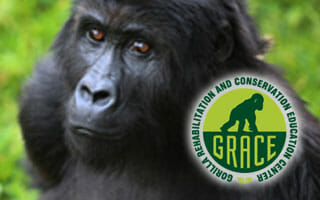
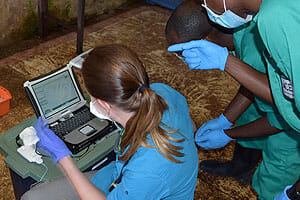
The Detroit Zoological Society has partnered with the Gorilla Rehabilitation and Conservation Education (GRACE) Center to conserve Grauer’s gorillas or Eastern lowland gorillas. Grauer’s gorillas are closely related to the western lowland gorillas at the Detroit Zoo but they are much more endangered. Grauer’s gorillas are hunted for their meat and sold as pets and further threatened by the civil unrest in the Democratic Republic of Congo (DRC). GRACE’s mission is to provide the best facilities and care for rescued Grauer’s gorillas in the DRC while working alongside local communities to ensure gorilla survival in the wild. In 2015, DZS veterinary staff traveled to GRACE to conduct health assessments of the gorillas and train local veterinarians, and in 2016, DZS education staff provided training in humane education.
Ape Taxon Advisory Group (TAG)
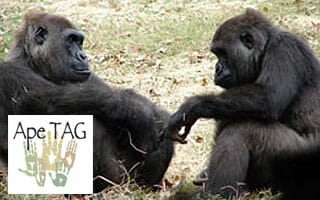 The Taxon Advisory Groups (TAGs) of the Association of Zoos & Aquariums have a mission to examine the conservation needs of an entire taxa or group of animals. The Ape TAG Conservation Initiative represents a collective effort by the Detroit Zoo and other zoos to help conserve wild populations of apes. Launched in early 2010, the primary aim of the Conservation Initiative is to increase the amount and duration of zoo support for ape conservation.
The Taxon Advisory Groups (TAGs) of the Association of Zoos & Aquariums have a mission to examine the conservation needs of an entire taxa or group of animals. The Ape TAG Conservation Initiative represents a collective effort by the Detroit Zoo and other zoos to help conserve wild populations of apes. Launched in early 2010, the primary aim of the Conservation Initiative is to increase the amount and duration of zoo support for ape conservation.
Amboseli Trust for Elephants
 The Detroit Zoological Society supports African elephant conservation through its long term commitment to the Amboseli Trust for Elephants which initiates, supports and ensures the continuation of key elephant research projects across the African continent. The Trust is developed on the work of elephant expert Cynthia Moss who has studied and protected the elephants of Kenya’s Amboseli National Park for over 35 years. In addition, DZS added its voice to the growing chorus of conservationists, policy makers and caring individuals who are demanding an end to the slaughter of Africa’s elephants. DZS supports the Wildlife Conservation Society’s 96 Elephants campaign to halt the sale of ivory, bolster elephant protection and teach people about the link between ivory and poaching.
The Detroit Zoological Society supports African elephant conservation through its long term commitment to the Amboseli Trust for Elephants which initiates, supports and ensures the continuation of key elephant research projects across the African continent. The Trust is developed on the work of elephant expert Cynthia Moss who has studied and protected the elephants of Kenya’s Amboseli National Park for over 35 years. In addition, DZS added its voice to the growing chorus of conservationists, policy makers and caring individuals who are demanding an end to the slaughter of Africa’s elephants. DZS supports the Wildlife Conservation Society’s 96 Elephants campaign to halt the sale of ivory, bolster elephant protection and teach people about the link between ivory and poaching.
Chipangali Wildlife Trust
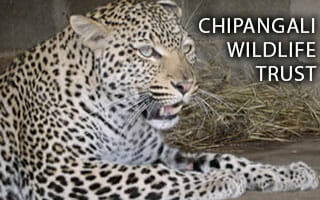 The Detroit Zoological Society supports important research conducted by Chipangali Wildlife Trust’s research staff on the duikers (forest antelopes) of sub-Saharan Africa and on leopards, cheetahs and brown hyenas in Zimbabwe as well as the conservation and care of animals at Chipangali Wildlife Orphanage in Zimbabwe.
The Detroit Zoological Society supports important research conducted by Chipangali Wildlife Trust’s research staff on the duikers (forest antelopes) of sub-Saharan Africa and on leopards, cheetahs and brown hyenas in Zimbabwe as well as the conservation and care of animals at Chipangali Wildlife Orphanage in Zimbabwe.





